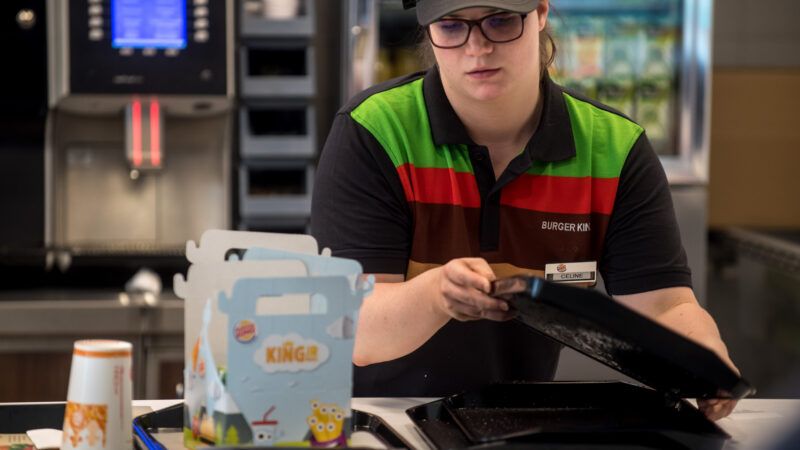Don't Freak Out Over Teens Having Fast Food Jobs
"I think it's really good for a lot of young people, no matter if they need a job or not, to work," says one college student who got her first job at 16.

Teenagers are less and less likely to meet once-important milestones of independence. Young people are now less likely to have a driver's license, less likely to be sexually active, and less likely to have a job than their parents were. However, some states are enacting reforms that might help with one of these trends. In the face of a severe labor shortage, several states are liberalizing child labor laws, making it easier for teenagers to enter the work force.
But while the recent attempts to liberalize child labor law have been minimal at best, it hasn't kept critics from framing the reforms as inherently exploitative and dangerous—an approach that ignores the numerous benefits to employment among teenagers and the scores of teens who desperately want the responsibility and financial independence a job can bring.
Over the past year, several states have proposed reforms to their child labor laws in an attempt to ease labor shortages. Last year, New Jersey enacted a bill allowing teenagers 16 and older to work up to 50 hours a week during summer break with parental approval. In Ohio, the Legislature is considering a similar proposal, allowing 14- and 15-year-olds to work later hours as long as their parents consent. Last month, Arkansas Gov. Sarah Huckabee Sanders ignited particular criticism when she signed a bill that removed the state's requirement that 14- and 15-year-olds obtain government permits to work.
Even though Sanders pointed out that the new law brought Arkansas in line with several other states, including Arizona, Colorado, and Texas, critics framed the law as both extreme and likely to lead to increased child abuse. In particular, as Reason's J.D. Tuccille notes, critics cite "the dangers of illegal child labor involving migrant children, critics immediately attacked the idea of eased legal employment."
Terri Gerstein, a Harvard labor researcher, asked in The New York Times, "when child labor violations come to light, especially horrifying ones, shouldn't elected officials strengthen laws and fund enforcement rather than allow more children to be exploited?"
On Monday, a TikTok video went viral on Twitter, apparently showing a 13-year-old working at Chick-fil-A. Notably, the video doesn't appear to show any child labor violations. The teenager says that his father owns the store, and children are generally legally allowed to work at businesses owned by their parents. While most of the replies to the video were positive, the pro-union nonprofit that posted it insisted on framing a teenager working for his parents as a bad thing: "The National Restaurant Association—a lobby group funded by big food corporations—is a key driver behind new bills letting kids work dangerous jobs."
Yep, taking drive-thru orders and slinging waffle fries sounds like the definition of danger.
But by portraying teenage workers as being helplessly exploited, critics miss both the economic benefits of working as a teenager, as well as the pride most teenagers feel about their after-school or summer jobs.
"I just wanted to start not sitting around all summer, and I wanted to have my own money that I didn't have to ask my parents for to pay for things I wanted," says my stepsister Virginia Buchanan, a sophomore at Auburn University. Buchanan got her first job at 16 working at a local Chick-fil-A. Our brother joined her soon after—he got his first job scooping ice cream as a high school freshman.
"I think it's really good for a lot of young people, no matter if they need a job or not, to work," Buchanan told me, adding that the experience taught her practical skills, like "how to work with people, maybe people you don't necessarily like, but learning how to get along with them enough to get the job done."
But my younger siblings aren't the only ones who see the clear benefits of getting jobs as teenagers. Empirical evidence shows that the benefits of being employed as a teen last for years after landing the first job. One 2014 study looking at the long-term impacts of teenage employment found that "for a young adult in high school at the turn of the millennium, 20 hours per week of part-time work in their senior year resulted in annual earnings that were 20 percent higher 6-9 years after graduation, as compared to their fellow students who didn't work."
The lifetime benefits of working as a teenager make sense when considering the responsibility and practical skills it teaches young people. "In a job, teens are forced to discover or build out parts of themselves that are not required for school, home or sports," psychologist Lisa Damour told The Washington Post last year. "Teens will meet the moment, but if it's the same moment over and over, there's no need to grow."


Show Comments (80)